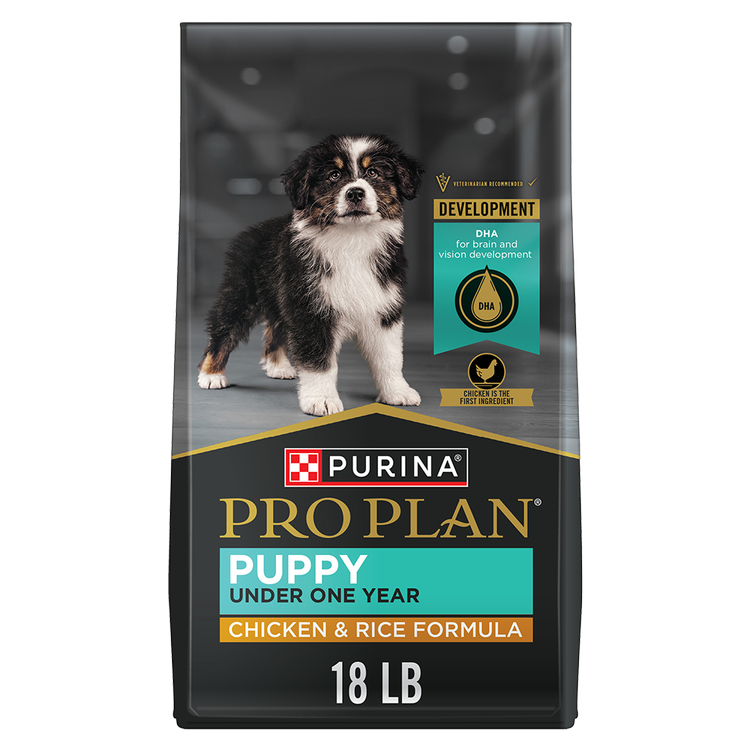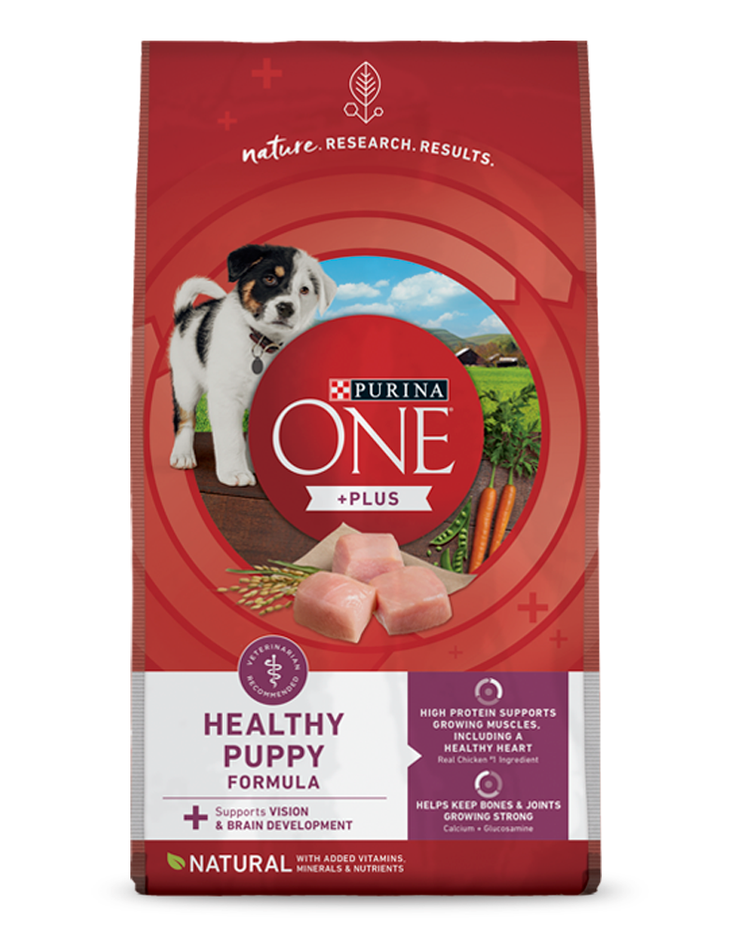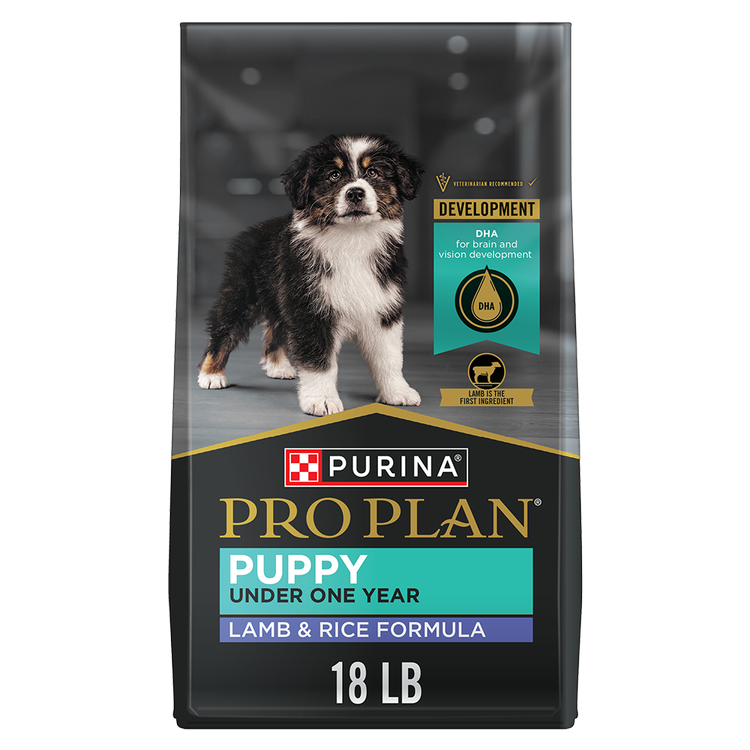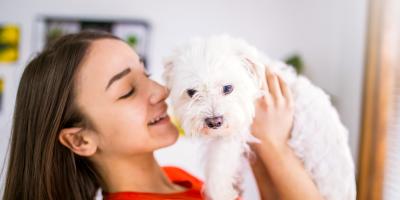There are few more memorable experiences than bringing a puppy home for the first time. The first year is a busy time where they’ll go through several puppy growth stages, both physically and mentally.
Whether it's going from puppy food to adult dog food, learning from their littermates, to creating a special bond with you, there’s a lot to look forward to.
If you’re a new dog owner, here are some insights and things to expect as you track your puppy’s development week by week.
0 to 8 Weeks
First Impressions
Though most puppies won’t be at their forever homes yet, the first eight weeks are some of a puppy’s most impressionable. Puppies’ brains undergo a big developmental spurt during this period in the puppy development timeline. This leaves a small window for them to learn everything they need to shape their personality and create the foundation for future behaviors.
To start your puppy on the right track, give them plenty of playtime with their littermates and shower them with human attention when they’re ready.
Puppy Development & Health: Body Control
In the first seven weeks, your puppy will gain almost full control of their body. During this time, they’ll develop motor skills, gain bladder control, use all their senses and begin growing baby teeth.
There’s no need to guide them through these changes. Much like a baby walking for the first time, they’ll figure it out all on their own.
Dog Behavior: Socialization
Your puppy’s first socialization experiences are the single most important part of their upbringing. This is where they begin to understand the world around them.
During this time, they learn things like how to play, bite inhibition, discipline and social skills. Puppies learn these important lessons by interacting with other puppies. Make sure they spend plenty of time with their mom and littermates to reinforce “puppy programming.”
This is also the ideal time to start giving puppies positive experiences with people. Whenever you can, try to introduce them to people and let them get familiar with the touch, smell and sound of humans.
Puppy Nutrition at 6 to 8 Weeks
Puppies start eating solid food around weeks three and four. By 6-8 weeks, they should be fully eating puppy food. Puppies have unique nutritional needs. They need more protein for growing muscles, DHA to support brain development and a proper calcium and phosphorous level for growing bones.
Puppy food has a different nutrient profile than adult dog food to meet those needs. Ensuring your dog is on a well-balanced puppy food is essential to helping them grow big and strong.
Typically, small-breed dogs will physically develop faster than large breeds. Depending on their breed size, you’ll want to feed them puppy food until around one year of age. For larger breeds that take longer to reach maturity, you may want to wait a bit before making the switch to adult dog food. Either way, talk with your veterinarian about when to make the change with your dog.
8 to 16 Weeks
Learning the Ropes
During this time, you will see exciting and significant changes. Your puppy’s brain will continue developing and they’ll begin to better acclimate to the human world. This phase focuses entirely on you and your puppy. Get ready to form a strong bond and take an active role in molding them into a well-behaved, well-adjusted dog.
Puppy Development & Health: Training & Shots
Puppy training starts the minute you bring them home. You might not always be actively teaching your puppy, but their minds are young and constantly learning both good and potentially undesirable behaviors.
The best thing you can do is begin formal training as soon as possible. Teach them everything from where to go potty to walking with a leash to understanding basic commands like “sit.”
Contact your veterinarian and ask about which vaccinations your puppy needs and schedule an appointment.
Puppy Behavior Milestone: Human Bonding
Puppies tend to bond with their littermates as their first socialization stage. That’s where they primarily spend time with their littermates learning about being a puppy. But human socialization – your puppy’s second socialization stage – should start early, so they get used to people and feel confident about interacting with them.
By now they should have had lots of human interactions, but a lot of their socialization will have come from time spent with their littermates learning about being a puppy.
This time, it’s about increased human interaction, bonding and how to be a dog in the human world. Spend as much time as you can schooling and playing with your puppy during this period.
It’s key to helping them learn good behaviors and shed the bad ones. With enough support, your dog will grow into a socially confident and well-bonded dog. This is both an important and fun time, so enjoy forming this new relationship.
If you’ve noticed your puppy biting a lot, that’s normal, but you must address it. Along with tail wagging and yipping, nipping is one of a puppy’s primary methods of communication.
Usually, puppies will nip to get you to play. But psychologically, it’s a way for them to learn the limits of what they’re capable of and how their actions affect those around them.
During this socialization stage, they began to learn bite inhibition. If the lessons didn’t fully sink in, it’s up to you to teach boundaries and stop your puppy from biting.
At this time, you should begin to lay the groundwork for your puppy’s future training routine. It’s probably too soon to teach them commands, but it’s not too soon to teach them proper socialization, clear communication, good manners and boundaries.
From 8 to 16 weeks, puppies should be safely exposed to as many people, places and experiences as possible. Learning that the world around them is a positive and fun place and their human family is there to help them explore it will likely make it easier to train them as they grow older.
Be sure to go at a pace that works for your specific dog. By about six months puppies should be able to interact well with people and other dogs and understand when you say, “No biting.” They should also have made good progress when it comes to housetraining, coming when they’re called and waiting politely before their meals are served.
They may not yet know “sit” or “stay,” but they should be learning to mind their manners. If all goes well, they’ll have a solid foundation of training from about six months to one year of age, making it easier to hone their training skills. At that point commands like “Sit,” “Stay,” and “Leave it” should be familiar to your puppy.
Making sure your puppy is reaching their training milestones will help your puppy learn what is expected from them and get them on the right track to becoming a confident, happy and well-behaved dog.
Puppy Nutrition at 8 to 16 Weeks: How Often Should You Feed Your Puppy?
Typically, for the first six months, most dog owners should feed their puppy three times a day – morning, mid-day and evening. Check with your veterinarian to see what the right approach is with your puppy.
Also, size does matter: Breeds that weigh 50 pounds or more at maturity should eat a large breed puppy food. Large breed formulas offer an appropriate number of calories to meet larger dogs’ needs. They also promote joint health, which can be a concern for dogs of this size.
4 to 6 Months
The “Adolescent Years”
Think of these few months like your puppy is in elementary school. Sometimes they’ll be a perfect angel, while other times, they may be completely disobedient.
Be patient. Your puppy is figuring out their place in the world. Keep calm and keep your puppy on a consistent daily routine so they know what you expect. With your guidance, your puppy will follow the guidelines eventually.
Puppy Nutrition at 4 to 6 Months
Around this time, your puppy will make a giant leap in growth and get closer to their full size. Expect an increase in their playfulness and energy levels.
Depending on their breed, they may shed their puppy coat for an adult one and grooming might help the transition. Be on the lookout for new chewing habits. It’s a sign they’re teething, and you’ll want to try to ease any discomfort.
Puppy Vaccinations
During this time your puppy will be getting their core vaccinations including rabies, canine distemper, adenovirus, parvovirus and any other puppy shots your veterinarian recommends. Until they’ve gotten all their shots – usually around the five- to six-month mark – they should not go to dog parks, restaurants or common play yards. They can, however, socialize with other dogs who are fully vaccinated in their own yard or the yards of their dog friends.
6 to 12 Months
The “Teen Years”
At six months, your puppy is getting closer to adulthood. If your dog is a smaller breed, they’ll hit adulthood around the age of one. Larger breeds will reach full maturity closer to age two. The last 6-18 months (about one and a half years) will mix in a lot of fun with a new set of challenges.
Your puppy will become more mature and gain some independence, which will let you get out and do more with them. But don’t forget – your dog is still a puppy and needs to follow the rules.
Puppy Development & Health: Final Growth
By now, there’s a good chance your puppy has grown close to their full height. Over the next 6-18 months, they’ll finish filling out their frame. Continue to feed a complete and balanced food. And don’t be fooled; while they might look fully grown, inside, your puppy still has lots of growing up to do.
Puppy Behavior: Energy Boost
At the point where they have a near full-sized body, your puppy will be highly energetic. Playtime will be especially fun, but in this time of excitement, they might forget some of their training.
Your puppy will spend lots of time exploring and will be easily distracted. Don’t be shy about reinforcing the rules or even making new ones. If you’ve been practicing good boundaries and communication during the earlier phases of your puppy's life, it will really pay off here. If your puppy starts causing trouble, try redirecting their energy toward healthy outlets like fun activities or socializing with other puppies.
Puppy Nutrition at 8 to 12 Months
Continue feeding a specially formulated puppy food until they reach adulthood, according to their breed size.
12 Months
Puppyhood Graduation
Around the one-year mark – two years with large breeds – your puppy’s bones and joints are full size, and their muscles, internal organs, immune system and cognitive skills become fully developed. At this point, your dog has reached adulthood and can begin eating a complete and balanced dog food.
Breed Size & Puppy Development Stage Chart
The general rule of thumb is dogs less than 12 months of age are puppies. However, a puppy’s breed size can affect whether they reach adult maturity before 1 year of age or reach full maturity closer to 24 months (about 2 years).
Every dog is different. The following guidelines can help you know when to ask your veterinarian about transitioning to adult dog food.
| SIZE | ADULT WEIGHT | TYPICAL AGE AT MATURITY |
|---|---|---|
| Extra Small Breeds | < 8 lbs | 9-11 months |
| Small Breeds | 8-20 lbs | 12 months |
| Medium Breeds | 21-50 lbs | 12 months |
| Large Breeds | 51-130 lbs | 18-24 months |
| Giant Breeds | > 130 lbs | 24 months |
Many dog owners make the mistake of switching their puppy over to adult dog food too soon – before their body has finished growing. It is important to feed your dog food that is formulated for puppy growth and development up to the point that they reach full adult maturity. If you have specific questions regarding your dog’s development, be sure to consult your veterinarian.
Learn more about puppy health from our pet experts on our Pet Expertise page.

Be Rewarded for Your Purina Purchases
Earn and redeem points for Purina products with myPurina app.








